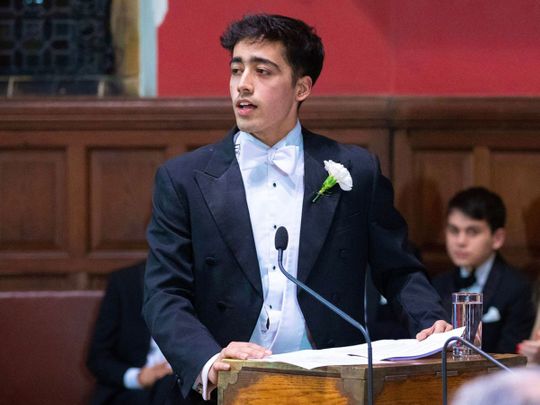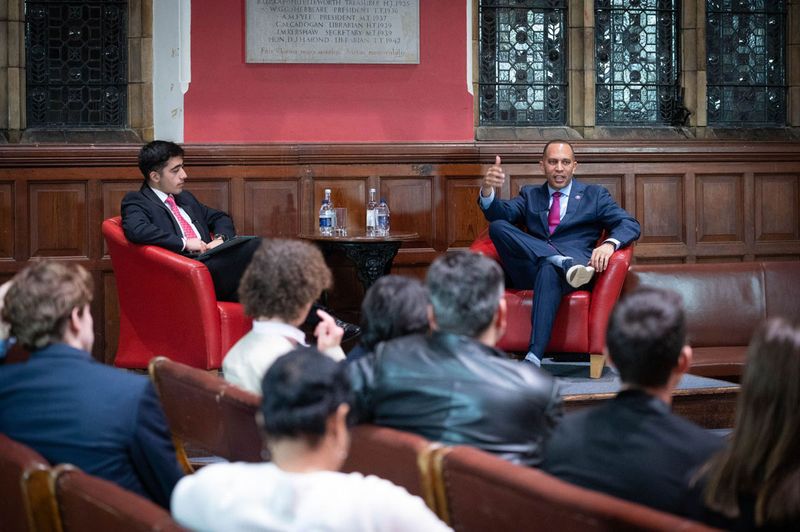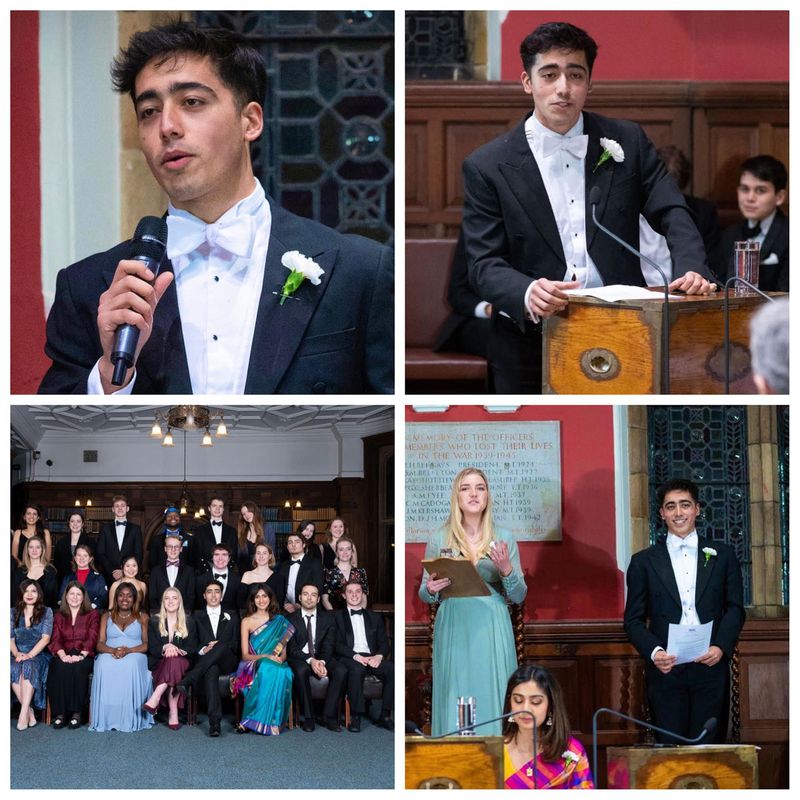
Ahmad Nawaz is the newly elected president of the Oxford Union, United Kingdom. Ahmad’s life in the last eight years is an epic of incredible loss and superhuman resilience.
On December 16, 2014, Ahmad’s younger brother Haris, thirteen, was killed in the worst, the bloodiest, the most terrifying terror attack in the history of Pakistan. Peshawar’s Army Public School (APS) was attacked in a manner so brutal, so dark, there are few parallels of such inhumanity in the recent history of the world. Out of the 150 people massacred that day, 141 were children and teenagers. Ahmad’s friends and class fellows were killed. Shot in the arm, Ahmad survived the attack, the scars of which are indelible on his family’s heart and the collective soul of Pakistan.
In February 2015, Ahmad, after intensive hospitalization in Pakistan, travelled to the UK for further treatment of his arm that had suffered severe nerve damage. His father Mohammad, mother Samina, and brother Umar accompanied him. The devastated family began rebuilding of their lives in Birmingham, looking after Ahmad as he healed from his injuries, mental and physical, and being there for one another, every step of a very difficult way.
A new world, a new environment, a new people, a new language, the Nawaz family turned every alien thing into an affirmative energy as they continued their reconstruction of a home in which love was abundant, pessimism a big no, their pain a quiet landscape adding meaning to each day of their lives. As they mourned the loss of their son Haris, and focused on Ahmad’s recuperation, their principal priority was to lead normal lives.

Ahmad’s education was always important. In 2020, he joined the Lady Margaret Hall, Oxford University, a momentous occasion for the articulate, intelligent young man and his proud family. In March 2022, the Coventry University, UK, awarded Ahmad the Honorary Doctorate, Degree of Doctor of Letters, Honoris Causa.
In his years of activism against the radicalization of the young and advocacy of other youth related issues, Ahmad travelled to many countries and interacted with world leaders, changemakers, intellectuals, and students. An excellent orator—his passion for positive change and his wiser-than-his-age rationality makes his oration real, empathetic, powerful—Ahmad’s message of peace is both personal and global.
With his constant attention to his education and extracurricular activities, on March 6, 2022, Ahmad, twenty-one, was elected the president of the Oxford Union, “the world's foremost debating society.” Ahmad made history that day as he became the second Pakistani ever to become the president of the Oxford Union. Benazir Bhutto was the first one. On June 21, 2022, Ahmad officially began his work as the President of Oxford Union.
What time has also strengthened is the bond Ahmad shares with his parents, brother Umar, and his youngest sibling, Adil, now three. In March 2022, Umar, a star footballer, signed with the Wolves Academy, one of UK’s leading youth football facilities. His father, having suffered the worst pain for any parent—burying a child—remains Ahmad’s rock, the person who always has his back.
Ahmad’s story is that of the triumph of human spirit that is unbreakable despite the most heartbreaking tragedy. Ahmad’s story is the transformation of destructive pain into a source of strength that is your daily reminder that there is nothing that scares you; there is no problem you are not equipped to deal with; there is no wound, emotional or material, that would stop you from making your dreams come true; there is nothing that is impossible.
Haris is watching his big brother, his beautiful face aglow with a giant happy smile.

For Gulf News, I asked Ahmad Nawaz a few questions:
Mehr Tarar: Congratulations on being elected the president of the Oxford Union, one of the most prestigious student body positions in the world in “the most famous debating society in the world”. What are the credentials that are instrumental in you achieving this utterly remarkable distinction?
Ahmad Nawaz: As the Oxford Union presidency is an elected position, the eligibility credentials require a great deal of work in the [Oxford] Union to go up the rankings. Most people start at the Secretary’s Committee, which is the beginner committee. That’s where I ran for election in my first term at Oxford [University]. In my second term, I contested for the Higher Committee, which is the standing/governing body; I served a term there in which I did a lot of work, including inviting speakers. Then I moved on to running for Treasurer, which was backed by my credentials of being on the Secretary and Standing committees. After serving a term as Treasurer, I ran for president.
In running for president, many things matter: how you deal with people, how you deal with people’s concerns, how you demonstrate that you can handle people’s concerns. It has a great deal to do with demonstrating a certain level of leadership and a certain level of trust—that people can trust you in this leadership position. In my two years of uni, alongside my studies, I have focused on ensuring that I deliver the most competent term cards so that people can judge for themselves if they trust me to be elected to the post of president.
Reaching the position of president also requires immense persistence. Perhaps the reason why we don’t see many Pakistanis in this position is the reality of several impediments on the way, especially for people from disadvantaged backgrounds like ours. It’s perseverance that keeps you going, that gets you there.
In your roadmap for the Oxford Union 2022-2023, what are the traditions you plan to follow while doing work that is innovative, inclusive, unifying?
The roadmap for the Oxford Union entails many important things, mostly speaker events and debates that the Union arranges on a regular basis. We strongly adhere to the tradition of guaranteeing that we have free speech in that chamber. This society was founded on the basis of free speech, and I believe that upholding that tradition is the most important job of the president of the institution.
I also think a great deal of access and inclusion work can be done within the Union and for the people outside. So firstly, it is about involving and making it easier for more people from disadvantaged backgrounds to get involved and reach the point where they can lead this institution.
From a global perspective, the agenda is to have events and host speakers who are inspirational to the younger generations in many ways. Speakers whose work and ideas are thought provoking are the ones we bring to this chamber. Our aim is to have them speak not just to the students in the chamber but also the entire world through our social media platforms. Having speakers that can have a positive influence on young people is extremely important.
Inclusion is essential, and I will be focusing on that, together with protection of freedom of speech, having incredible speaker events, and ensuring that more people from different backgrounds can access the institution in the future.
Do you envision the Oxford Union as a major global platform that has the potential to highlight diverse, contradictory, multi-layered and forward-looking narratives of people who have the intellectual, political, or governmental power to effect positive changes in their own spheres, and collectively, for the world’s good?
The Oxford Union does provide a platform for diverse, contradictory, and multi-layered narratives, and that is its beauty. The Oxford Union is the last bastion of free speech around the world, at the moment. It is the only platform where we can openly discuss controversial matters and bring them to a discourse so that people from Oxford can question those challenging narratives to reach a relatively satisfactory conclusion. The Union, as the bastion of free speech, has a responsibility to ensure that all sorts of voices are heard, as we provide a platform to all kinds of people. We also have a responsibility to question them, and scrutinize their claims and narratives, to the best of our abilities.
The Union has the potential to effect a positive change by having speakers who have interesting stories to tell. Speakers who have a lot of good life experiences, the sort of stuff that helps the world, in general, by shaping or improving the lives of the young people who are in the audience at not just Oxford but around the world through YouTube and other platforms.
In essence, we will have all sorts of speakers, regardless of how controversial they are, because that is the very point of debating. The Union is a very influential institution that empowers a lot of people through its debates and speaker events. I think if the young people are more scrutinizing, rather than being dismissive, of the more controversial opinions, it moves the world in a general deep end direction.
What, as an APS survivor, is your fundamental inspiration that works as your spirit and strength in your journey from that classroom in Peshawar on December 16, 2014 to joining the Oxford University, and now assuming the position of the president of the Oxford Union?
Being an APS survivor has been crucial for my resilience and my perseverance throughout the last few years, in everything that I have done. Whether it has been the social work that I have been doing, my studies, or the Union stuff, much of it has been inspired by that incident. It has been the thought of coming back from such a tragedy and setting an example for people who go through similar or other tragedies that no matter what happens in life, many new heights can be achieved. No matter how disadvantaged of a position you start from, you can always go to the highest of platforms and excel.
For me, it has become much more about the message. A lot of people who look up to my journey, as of now, they see that this person went through so much stuff, came from a very disadvantaged background, came into this country speaking no English, and is now rubbing shoulders with some of the highest intellectual minds and the most capable students in the world. I think this is a lot to do with inspiration being taken from a tragedy in life.
What has also inspired my journey to the Oxford Union is knowing that Benazir Bhutto was the last Pakistani before me to serve presidency of the Oxford Union.
Being able to tell people that one can achieve these heights regardless of the disadvantages that I have faced in life, I think, is an inspiring story for young people. It should make more people think that regardless of whatever situation they’re in, a higher position is always achievable. That’s something I’m proud of and would love to continue—inspiring people not just through a message but through my journey itself. Showing them how I have come from a tragedy but I’m reaching for the highest of starts.





